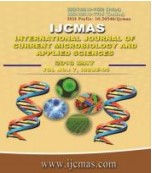


 National Academy of Agricultural Sciences (NAAS)
National Academy of Agricultural Sciences (NAAS)

|
PRINT ISSN : 2319-7692
Online ISSN : 2319-7706 Issues : 12 per year Publisher : Excellent Publishers Email : editorijcmas@gmail.com / submit@ijcmas.com Editor-in-chief: Dr.M.Prakash Index Copernicus ICV 2018: 95.39 NAAS RATING 2020: 5.38 |
An investigation was carried out to study the effect of storage period on organoleptic properties of guava leather prepared from its cultivars of Sardar (white flesh) and Lalith (pink flesh). Preliminary experiments were conducted to find out the optimum levels of sugar, citric acid and salt for preparation of quality leather. The leather prepared was packed in butter paper and stored at ambient (25+20C) and refrigerated temperature (5+20C) for 90 days to study their storage feasibility. Out of the seven treatments, best two T1, T2 are selected for further storage period of 90 days by sensory panel members on 9 point hedonic scale rating. The stored samples were drawn periodically at 30 days interval for analysis. The guava leather (625.76 g/kg pulp) was obtained from treatment V1T1 (750g sugar + 5g salt + 2g citric acid), followed by the other treatments (618.06 g/kg pulp) in V1T2 (750 g sugar) for Sardar guava variety, (624.00 g/kg pulp) in V2T1 (750 g sugar + 5g salt + 2g citric acid) and (617.00 g/kg pulp) in V2T2 (750 g sugar) for Lalith guava variety. The treatments V1T1, V2T1, and V1T2, V2T2 are same but mainly differ in cultivars of guava white and pink flesh. Chemical composition indicated that the fresh guava leather contained on an average 16.80 per cent moisture, 76.200Brix TSS, 14.36 per cent reducing sugars, 68.70 per cent total sugars, 0.541 per cent titrable acidity, 127.10 mg/100 g ascorbic acid. The guava leather prepared by using sugar, salt, citric acid (Treatment V1T1 and V2T1) were superior over the other treatments in respect of organoleptic properties. The mean score of fresh guava leather for colour and appearance was 8.60, flavor 8.50, texture 8.60, taste 8.30 and overall acceptability 8.50 on 9 point Hedonic scale. The storage studies indicate that there was a gradual decrease in organoleptic properties of leather with advancement of storage period. Sensory quality of guava leather decreased at faster rate during storage, which was more at ambient temperature than refrigerated storage. Total microbial count was low initially but increased slightly during storage. However guava leather was found to be acceptable in good condition even after 90 days of storage at ambient and refrigerated temperature.
 |
 |
 |
 |
 |